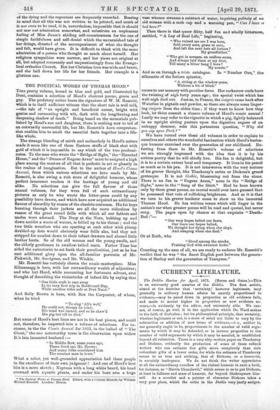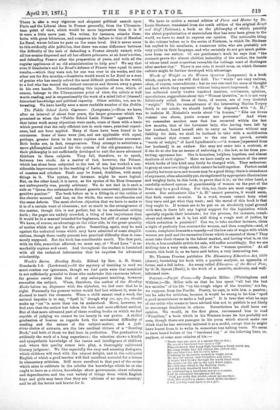CURRENT LITERATURE.
The Dublin Review for April, 1871. (Barns and Oates.)—This. is an extremely good number of the Dublin. The first article,. aimed at the doctrine that 'certainty,' however legitimate, may generally in ordinary human affairs be exaotly proportioned to evidence,—may be pared down in proportion as old evidence fails, and made to mount higher in proportion as new evidence an- crues,—is evidently by the editor, and extremely able. We can- not, of course, go with it in the application which Dr. Ward makes to the faith of Catholics ; but its philosophical principle, that certainty,. whether legitimate or not, is a state of mind not liable to vary by the subtraction or addition of new items of evidence,—i. e., neither is, nor generally ought to be, proportionate to the number of valid argu- ments by which it may be defended, or in inverse proportion to the. number of valid arguments by which it may be assailed, is established beyond all refutation. There is a very ably-written paper on Thackeray and Dickens, evidently the production of some of those refined writers who can estimate fine gifts more completely than rich redundant gifts of a lower order, for while the estimate of Thackeray seems to us true and striking, that of Dickens, as a humourist, is certainly inadequate. We do not think the writer appreciates. at all the extraordinary overflow of the richest humour in such a book, for instance, as "Martin Chuzzlewit," which seems to us to put Dickens,. at least in fullness and mass of humour, far beyond Shakespeare him- self. As a novelist and a painter of character Dickens takes a very poor place, which the critic in the Dublin very justly assigns. There is also a very vigorous and eloquent political assault upon Paris and the Liberal ideas in France generally, from the Ultramon- tane point of view, which would be more impressive than it is if it were a little more just. The writer, for instance, attacks Gam- betta with great bitterness, and compares his failure to that of Marshal Le Beset whose failure he pate on the same level. Did it never occur to this evidently able politician, that there was some difference between the difficulty of the task of defending a France already ruined, with all her armies dispersed and all her officers prisoners, at an hour's notice, and defending France after the preparation of years, and with all the regular appliances of an old administration to help you? We say that even if Gambetta's and Le &nes defence of France were equal in mere results,—which they were not, for one was over in six weeks, and the other not for five months,—Gambetta would stand to Le Bcenf as a man of genies who has nearly solved the most difficult problem in the world, to a fool who has wasted the richest resources and thrown away a game in his own hands. Notwithstanding this injustice of tone, which, of course, belongs to the Ultramontane point of view, the article is well worth reading, and is unquestionably the work of a mind full of (biassed) historical knowledge and political capacity. Other articles, too, are in- teresting. We have hardly seen a more readable number of the Dublin.



































 Previous page
Previous page